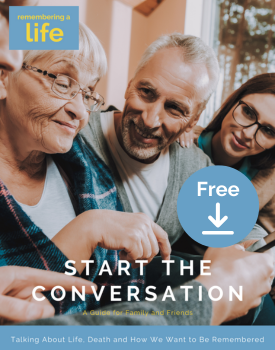When was the last time that you sat down with a family member and asked them about their life experiences? The moments that had a profound impact on them? What about how they want to be remembered?
If it’s been a while or you haven’t ever opened this kind of dialogue, you’re very likely not alone. We live in such a fast-paced world and often, we don’t even realize it. We interact with our loved ones in our usual ways, going about our daily lives, unknowingly overlooking the rich and unique histories they carry within. All too often, we don’t think to ask more about them until we are no longer able to.
If loss hasn’t touched your life yet, it might feel as though there is an endless reserve of time from which you can draw and that you can get around to your questions later. Maybe the idea of talking to a loved one anywhere near the subject of end-of-life is daunting. If you have experienced loss, you have probably come to understand the importance of having conversations with family and friends about the things that matter before it’s too late. You might now be able to look at a living loved one and think to yourself, if they were no longer here, what would I most want to ask them?
From my own grief experience, having lost my parents at a young age, I know the unique pain of lost conversations. Despite holding gratitude for the meaningful conversations I was able to engage with them in, the more that I age, the more new questions arise that they cannot answer. This is a phenomenon that I have witnessed in other grievers that I have connected with personally and in my work as a therapist. I truly believe that it is important to have compassion for ourselves around this and acknowledge that we only knew what we knew and only asked what we thought to ask then.
Although nothing can completely erase the helplessness we may feel when we think of these lost conversations, becoming more attuned to the possibility for meaningful dialogue with our living family members can be healing in itself. We can transform our anguish over the silence into deep and loving curiosity about those around us. It is not so much that we must move forward with urgency to have these conversations but that we engage in gentle acknowledgment of the sacred time we share here together. We might ask ourselves, when is the “right” moment to bring up this desire to connect? The truth is that there rarely ever is one. It’s completely understandable if a diagnosis or quickening of the dying process is the impetus and we also don’t need to wait for a life-shifting event to take place.
The Have the Talk of a Lifetime Conversation Cards serve as an incredibly helpful jumping off point for opening up with loved ones, especially if such intentional and intimate discussion feels somewhat foreign, as it might in some families. The deck incudes 50 questions ranging from “What is the most beautiful place you have ever visited? What made it beautiful?” to “If you could choose your last words, what would they be?”. You can bring the deck when visiting a family member one-on-one, open the conversation up to a larger group, or even plan a family gathering around using them. I went through the deck at home with my partner and we enjoyed connecting over the simplicity and nuanced meaning of the questions.
One of my favorite cards in the deck is “What is something very few people know about you?”. This card strikes me as both a vault-opener and an emotional intimacy-builder. We don’t often ask this question of other people and never know what quiet truths they may hold and wish a trusted loved one could hold too. Having this type of knowledge about a loved one could serve as a source of connection and comfort even after they are gone.
Something I appreciate about the deck is that it includes wild cards, which allow you to ask a question of your choice. Mine was what my loved ones’ most ideal death experience would be, whether that pertains to the setting, ambiance, rituals, or desired memorial service details. I am currently completing my death doula training and much of this work takes place around confronting our own deaths, considering what wishes we would want to have honored, and how we can play a role in advocating for families during the dying process. All too often this subject is avoided when it truly need not be.
Whether we are facing loss and want to learn more about our people before they go or have a desire to understand them more deeply, even in the absence of crisis, because we have known loss before, it is always a good time to have the talk of a lifetime.

